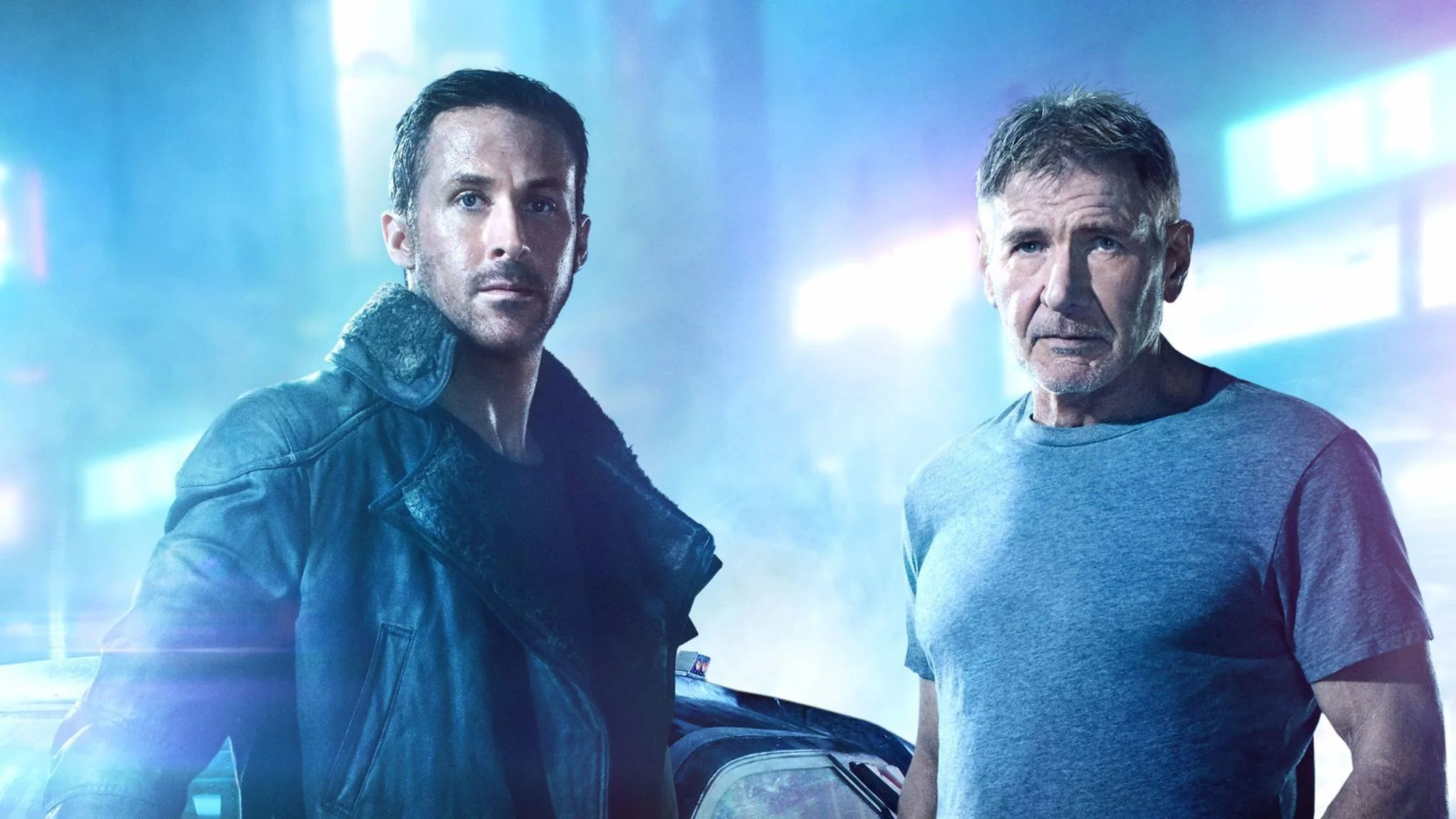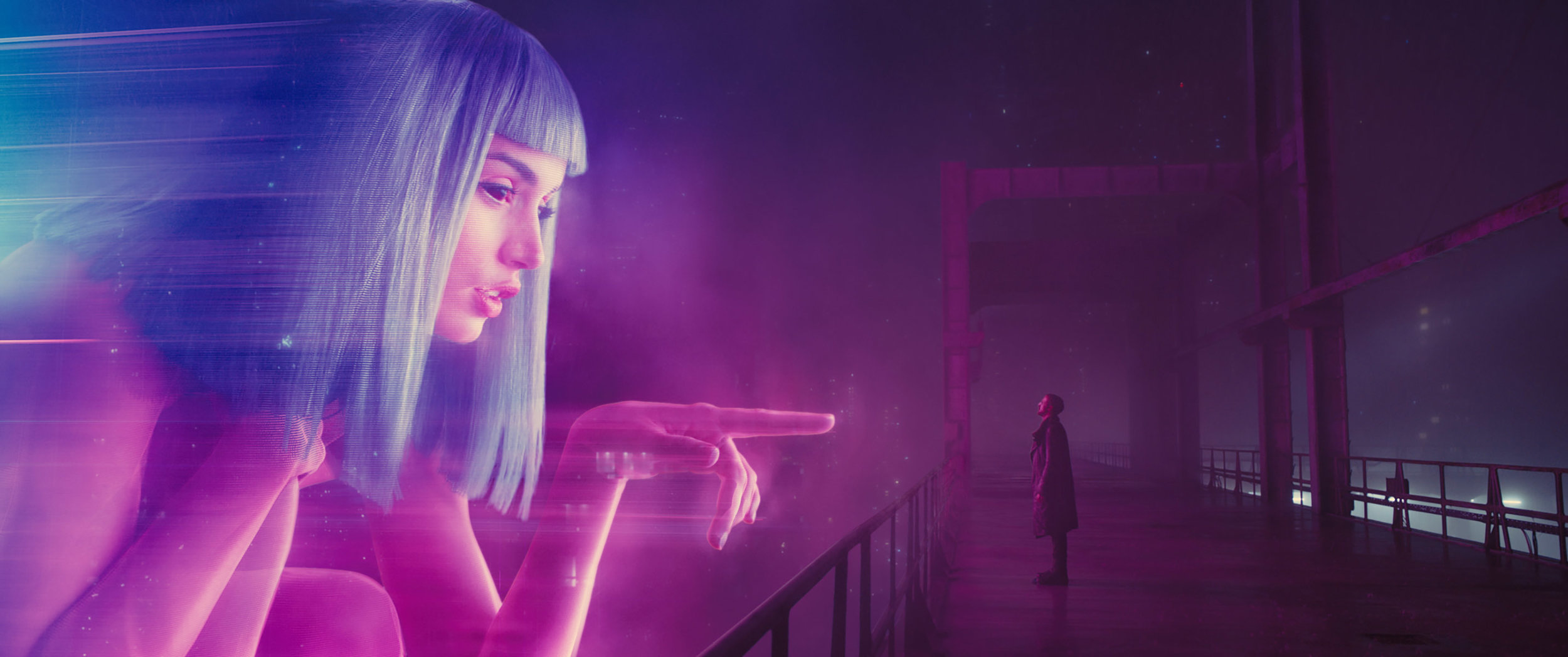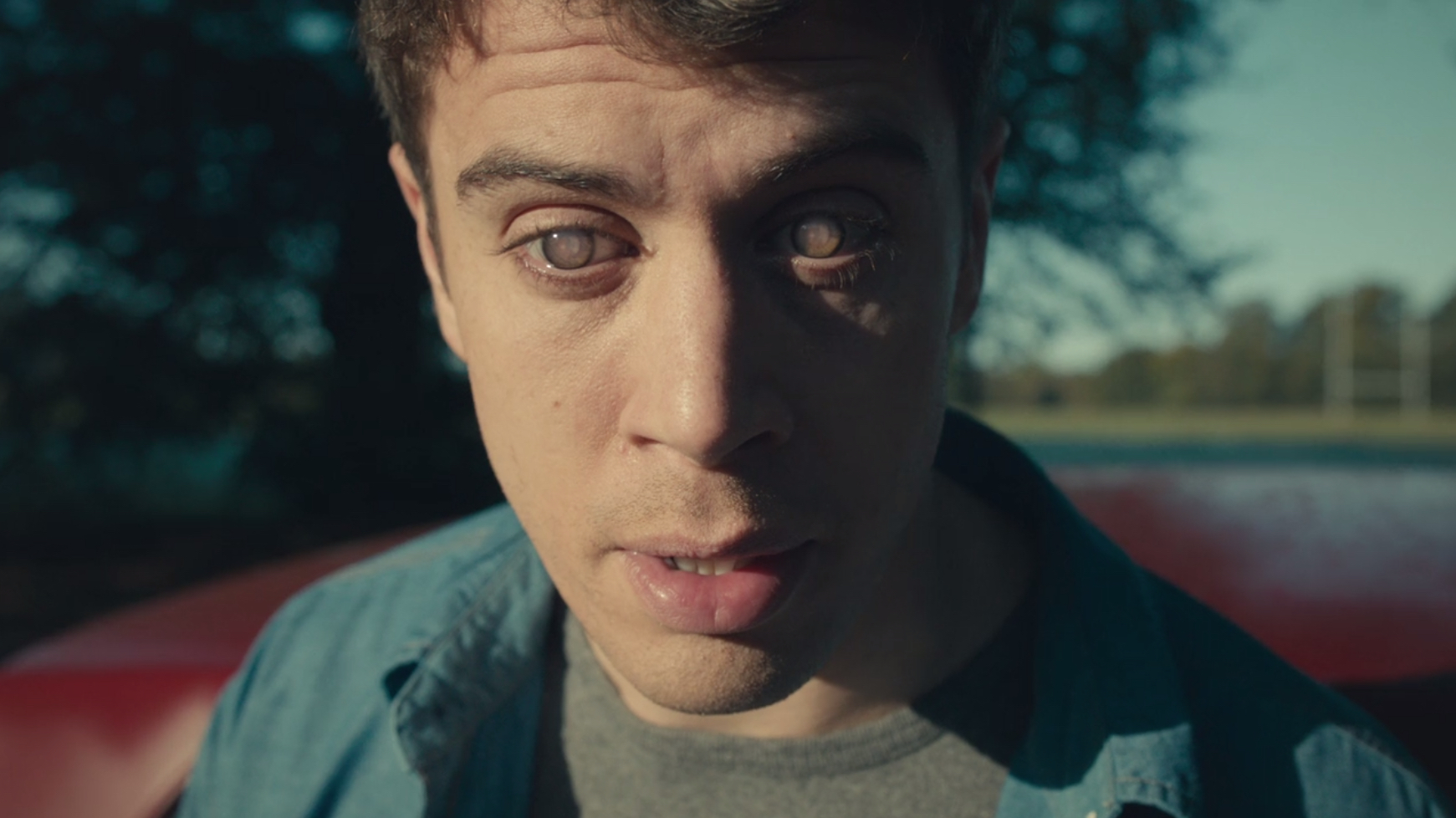Following up on our last conversation on Mission Log about holodecks, we discuss Star Trek: Discovery’s “Calypso” and the relationship between humanity and artificial intelligence. Check out the video above or download the podcast here.
Blade Runner 2049 Searches for Authentic Memories in the Digital Age
While it’s easy to get lost in the beauty of 1982’s Blade Runner, its science fiction film noir mashup vision of the future, or the meaning behind the story’s ambiguous ending (depending on the version you see), what I find most compelling about the film are its ideas about memory.
The story is set in Los Angeles 2019 where androids, called replicants, are nearly indistinguishable from humans. What separates both groups are authentic memories. Replicants are programmed with real childhood memories, though they are not their own. The memories are borrowed from the experience of human children. Implanting these memories in replicants gives them a foundational identity, improving their ability to act human. However, having false memories also keeps replicants from being seen as sentient life worthy of empathy.
Looking back, Blade Runner foreshadowed many of the issues psychology struggled with during the 1990's recovered versus false memories debate. Can our memories be tampered with? Can we verify that an event really occurred? How should we respond to memories we believe are false? Both psychological science and Blade Runner conclude that we do not experience binary truths or falsehoods. Our experiences exist on a spectrum of authenticity.
Blade Runner 2049 expands on the original in every way, including its ideas about memories. In the sequel, everything is meticulously digitally documented, replicants know they are programmed with false memories, and the accuracy of memories doesn't matter. What makes a memory real in 2049 is whether or not it makes you feel something.
Once again, Blade Runner 2049 references issues impacting our world. The internet, social media, and smartphones have allowed for the digital documentation of nearly all world events and every aspect of our personal lives. Psychologists question how our always-on, socially connected technology is changing the way memory works. Does access to a search engine limit what we learn? How does digitally capturing an event change the way we remember it? Do social networks impact the type of information we believe to be true? How can we have authentic experiences as we travel through social networks that feel increasingly inauthentic? Psychology does not have satisfying answers to these questions, at least not yet.
Most women in Blade Runner 2049 lack agency and only serve the interests of men.
Though it is a cinematically stunning film that tackles contemporary issues, Blade Runner 2049 has problems. Like the original, character development is limited. This is particularly problematic with 2049’s female characters, who (with one exception) lack any agency of their own. The film also feels less like a masterpiece and more like a blockbuster in its finale.
But if you are a fan of the original, or of the science fiction cyberpunk genre, Blade Runner 2049 is a must-see. If you're interested in these ideas but don't care for the original Blade Runner, watch the rebooted Battlestar Galactica television series for a similar (more egalitarian) exploration of artificial intelligence.
Best of the Psychology of Star Trek VS. Star Wars
It's San Diego Comic Con week! THE PSYCH SHOW celebrates by looking back at the best moments from the Psychology of Star Trek VS. Star Wars Comic Con panel series. Watch Dr. Andrea Letamendi and I debate Data VS. C3PO, explore failure and regret, discuss love in the final frontier and a galaxy far far away, and breakdown the psychology of the Federation and Galactic Empire.
Thank you to Brian Ward for moderating and our panelists for being so awesome:
- Larry "Dr. Trek" Nemecek (The Con of Wrath, Trekland: On Speaker)
- Hugh Sterbakov (Robot Chicken, City Under the Moon)
- John Champion (Mission Log: A Roddenberry Star Trek Podcast)
- Bryan Young (StarWars.com)
- Chase Masterson (Star Trek: Deep Space Nine)
- Catherine Taber (Star Wars: The Clone Wars)
- Rod Roddenberry (Trek Nation)
- Sam Witwer (Star Wars: The Clone Wars)
Be sure to check out Episode V of our panel later this week at Comic Con!
Crazy Sexy Geeks: Artificial Intelligence
My buddy Alan Kistler, the New York Times bestselling author behind Doctor Who: A History, just relaunched his podcast Crazy Sexy Geeks and asked me to join him for a discussion on artificial intelligence. From the ancient Greeks to Blade Runner and Avengers: Age of Ultron, we explore what would happen if machines came to life and why these stories resonate with us.
Download the episode, subscribe to the podcast, and follow Alan on Twitter.
Black Mirror Reflects the Psychology of 21st Century Technology
You either have no clue what Black Mirror is or you’re a rabid fan of it.
THERE ARE NO OTHER OPTIONS!
Black Mirror came out in the U.K. in 2011 and was recently released in the U.S. on Netflix. It’s an anthology series, like The Twilight Zone, with every episode focusing on a unique story and cast. There’re only 7 episodes so you can binge watch it in a day (here’s a guide to do that).
The series explores how technology is changing society. Charlie Brooker, the show’s creator, explained Black Mirror as the reflection “you’ll find on every wall, on every desk, in the palm of every hand: the cold, shiny screen of a TV, a monitor, a smartphone.”
There’s nothing like Black Mirror on TV. It’s the smartest science fiction I’ve seen since Battlestar Galactica’s reboot. It’s also the first show to really get 21st century technology. Check out what Wired had to say:
These episodes don’t scream “TECHNOLOGY IS BAD!!!” They’re not too far removed from contemporary life, and they’re not too familiar, either. Instead, they quietly, diligently burrow into the heart of what’s so terrifying about tech to begin with: our tendency to make stuff that caters to our worst selves. And that, friends, is what dystopian sci-fi is all about.
This is why I’m so obsessed with Black Mirror — it reveals dark truths about human nature and warns us about what might happen if we aren’t careful.
I’m going to expand on that and explore the psychology of Black Mirror. I won’t spoil the episodes — they work best if you go in without knowing what to expect. If you’ve seen the show, you’ll know what I’m talking about. If you haven’t, hopefully this will convince you to give it a try. Just skip episode #1, "The National Anthem", because no one likes it. The rest are awesome though, I promise.
Without eye contact humans become inhumane
"The Waldo Moment" shows us how easy it is to insult someone when you’re sitting behind a screen. We see the same type of stuff happen with Facebook bullying, Twitter GamerGate death threats, blog post comment flame wars, and Xbox Live hate speech.
What is it about the internet that makes it easy for humans to become inhumane? No eye contact!
Empathy, the ability to understand what other people are thinking and feeling, happens when we see other people. Here’s how it works:
- You do something hurtful.
- You see that the other person is hurt.
- Mirror neurons (empathy brain cells) detect their pain and make you feel bad.
- You stop the thing that hurt the other person and (if you’re nice) apologize for your actions.
None of this happens on social media. You don’t see the emotional impact of your actions. Without eye contact, your mirror neurons have nothing to do. No empathy.
You can predict when this is going to happen using my formula for online rage:
(Anger + Anonymity) - Eye Contact = Internet Trolls.
Psychologists have a name for this phenomenon — the nasty effect (a.k.a. the best psychological term EVER).
What’s the solution? I don’t have a good one — it’s very difficult to maintain the privacy of the internet while also promoting empathy. Creating self-governing communities where diversity of thought is rewarded and trolling is penalized is the best option we’ve got (for now).
Agreeing to a small thing makes it easy to agree to a big thing
“Fifteen Million Merits” takes on a lot of topics including reality TV, online avatars, freemuim games, and a little bit of Kickstarter. Dr. Jamie Madigan has covered most these including the psychology of video game avatars, Candy Crush, and Kickstarters.
What I want to highlight is the “foot-in-the-door technique”. It’s an old sales tactic that’s grounded in science. Get people to agree to a small request and they’re more likely to agree to a big request.
Maybe a friend doesn’t have HBO and asks if they can come over to watch Game of Thrones with you. You have fun and it feels good to share the awesomeness of Westeros with them. A few days later, they ask you for your HBO Go password. This is where the foot-in-the-door technique kicks in. You’re more likely to say yes to them because you want to stay true to what you've done in the past. I explore much more about this phenomenon (cognitive dissonance) in in my article on why people deny science and this episode of The Psych Show.
The foot-in-the-door technique is very profitable. President Obama’s 2012 campaign made a lot of money by getting you to open their emails, donate a small amount, and then ask for more money later on. Kickstarters projects succeed because once you’ve donated money you’re more committed to getting others to donate too. After you've invested a lot of time into a free game, spending some money to level up isn’t that big of a deal.
Revisiting memories changes them
What if you had the ability to replay any experience you’ve ever had in your life? That’s the premise behind "The Entire History of You", my favorite Black Mirror episode.
Memories aren’t a perfect recording of what’s happened in the past. Each time we think of something, new information gets combined with old memories. Think of memories like a live concert - the same song always sounds different depending on the venue, how the band is performing that day, and how we feel at the concert. There are infinite ways in which we experience the same memory.
How does this fit in with “The Entire History of You”? Even if you had a perfect recording of what happened in the past, you’d never have a perfect memory. Each time you’d play it back, your experience of that memory would change based upon how you’re feeling, who’s with you, and what’s happened since the recording was made. The more you’d revisit the memory, the more it would change. Certain details would stick out, others would be forgotten, and false memories could easily be created if people lie about what’s happening in the recording.
Relying on recordings also gets in the way of forming memories. That’s why Instagramming every moment of your vacation is a bad idea – you’re not going to be fully aware of what’s happening around you. Practicing mindfulness and taking photos of certain details you really want to remember is a much better approach.
One more thing – obsessing over every detail of everything you’ve recorded, that could lead you to experience a symptom of depression called rumination.
You are what you post online
Can you recreate someone based upon their online identity just like “Be Right Back” (and while we’re at Caprica)? Yes, for the most part.
Researching how people use the internet is difficult. Science is slow – research takes a lot of time to develop, get funded, cleared by ethics boards, and analyzed. Meanwhile, technology develops quickly. One day everyone’s talking about Meerkat the next people have moved on to Periscope. But based on what we know now, the way you use the internet is a good reflection of who you are.
The strongest relationship seems to be personality and social media. The updates you post and the things you like are a good reflection of your basic personality – how much you want to be with people, how trusting you are, the stability of your emotions, your ability to organize, and your curiosity. Social media can also predict your gender, religion, sexual orientation, and how much you use drugs based on things like whether or not you like curly fries and thunderstorms.
While all this stuff is important, there’s much more to you than your personality and demographics. What you've done in the past isn’t always a good predictor of what you’ll do in the future. Your actions are a complicated mess of what you've learned, how you’re feeling, what’s happening around you, and your immediate thoughts. Your internet profile doesn’t have access to all that data, at least not yet.
Here’s how this does impact you right now. Companies are already using Google searches to screen applicants. It probably won’t be too long until your Facebook likes impact your credit score and your tweets influence your health insurance premium. Then there’s the pesky question of who owns your social media after you die...
Being recorded changes your behavior
What happens when people take photographs and videos of you on their smartphones (like "White Bear")? Something called objective self-awareness.
This happens whenever you see your reflection in a mirror, realize you’re being watched in a bank, or see a photo of yourself on social media. You compare how you think of yourself to how you actually are. Most of the time this leads you to change something. Maybe you fix your hair, act more professional, or get stuck thinking about a specific part of your body.
Technology is increasing objective self-awareness and with wearables, drones, and live-broadcasting gaining popularity, things are going to get worse. For more on this topic, check out my video on how technology is turning everyone into a celebrity and the paparazzi.
Self-awareness makes artificial intelligence alive
The most recent episode of Black Mirror, “White Christmas” touches on the ethics of artificial intelligence. It’s a popular topic right now as Her, Chappie, Ex Machina, and the upcoming Avengers: Age of Ultron tackle similar issues.
The big question is this: how will we know if an artificial intelligence is alive? Futurist Martine Rothblatt, a pioneer in the field of cyber consciousness, believes objective self-awareness is the test we’ll use to figure this out (check out her SXSW keynote for more on that). Does the AI understand what it is? Does it value its life? If so, how does it want to live? Like all basic human rights, Rothblatt believes artificial life should have the choice to be in the type of state it wants to be. The problem is as cyber consciousness gets close to human consciousness, it’s going to be very hard to know if the AI is mimicking humans or if it is really alive.
This moment of technological singularity could become the greatest test humanity has ever faced – how will be treat a species that is just as intelligent as us? I’m hoping for more of a Star Trek: The Next Generation outcome and less of a Terminator future.
There’s a lot more I could say about Black Mirror, the psychology of technology, and where we’re headed as a species. But I’ve had my say – what do you think? Are we doomed to live in a dystopian science fiction future or will all this technology usher in an era of peace and prosperity? Let’s discuss in the comments below.
For more on Black Mirror, check out my review on Super Fantastic Nerd Hour. To detox from all this scifi, watch the hilarious Black Mirror: In Real Life.











